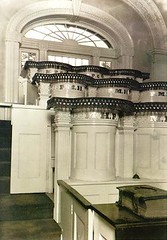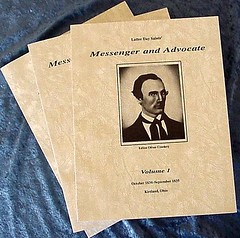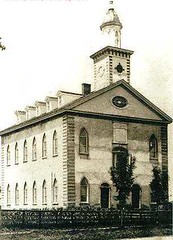BYU Student Protesters Face Disciplinary Action
If you recall, Soulforce, a pro gay activist group recently visited BYU, along with a host of other Christian universities across the United States. At that protest visit, at least five BYU students actively participated in the "die in" protest on campus where they fell down and pretended to die.
The Deseret News reported that these five students now face disciplinary action for possible honor code violations:
The actual honor code provisions that discuss homosexual behavior, which you can read in full here, states:
I don't necessarily think this activity warrants expulsion from BYU; but, I do think it warrants some lesser disciplinary action by BYU against these students.
I agree with Haven Herrin's statement to the Deseret News, that BYU's actions will have implications beyond the current five students who participated in this protest. I also think it will help further define, what I also believe are some rather vague provisions in the honor code. Perhaps it will prompt some actual revisions by BYU's administration in this portion of the honor code.
The Deseret News reported that these five students now face disciplinary action for possible honor code violations:
The other 24 arrested included four BYU students and two former students, BYU Police Capt. Mike Harroun said. They were arrested April 11 when they staged a campus die-in, a protest that consists of falling to the ground as if dead.
The Honor Code Office review, confirmed by BYU spokeswoman Carri Jenkins, could clear the students or result in punishments that possibly could include expulsions.
"We were supposed to find out (Tuesday)," said Lauren Jackson, a freshman from Baxter, Tenn., "but none of us heard."
Jackson is taking spring classes while she awaits the decision. The other students arrested were Alexander Liberato, 22, Matthew Kulisch, 24, and Timothy Burt, 18. Kulisch told media he is gay and Jackson worried that could lead to a more severe punishment.
"I'm mainly just nervous for Matt, the individual who came out," she said. "He's at the highest risk, I think."
Jackson and Liberato participated in the demonstration to urge other students and members of The Church of Jesus Christ of Latter-day Saints, which owns BYU, to avoid treating gays harshly.
"I feel like (the Honor Code Office reviewers) were very receptive to my message," Jackson said. "I participated to raise awareness or increased understanding for individuals who suffer from problems because individuals isolate or mistreat them."
Haven Herrin, co-director of the Equality Ride and coordinator of the BYU stop, said she understood a fifth student, who marched with the group at BYU but did not participate in the die-in, was under review for a possible honor code violation.
Jackson confirmed that and BYU's Jenkins said five students who participated were under review.
Herrin said the results of the review will carry weight beyond the fate of five student careers at BYU.
"Whatever stand BYU takes will more clearly define where the university stands," she said. "Many of the students I spoke to are not clear on BYU's stance regarding the treatment of gay people or of the church's policy. This will probably be a defining moment for them."
Jenkins expressed surprise at Herrin's statement.
"I was there when they were mingling amongst our students and overheard conversations and our students explained our honor code very accurately," Jenkins said.
Soulforce alleged wrongly in a press release after the BYU arrests that BYU does not allow gay, lesbian, transgender or bisexual students to enroll. The honor code does not ban those students, but bans sexual activity outside marriage and advocacy of a gay lifestyle.
"The honor code is directed toward behavior, not orientation," Jenkins said.
The actual honor code provisions that discuss homosexual behavior, which you can read in full here, states:
There has been a great deal of discussion about what some of these provisions mean; however, I think a legitimate argument can be made that actively participating in this particular demonstration and "die in" violates the honor code. I think the BYU five who, purposely, voluntarily, and actively went out of their way to "die" in this protest were "advocating" a gay lifestyle.Sexual and similar misconduct
The Church of Jesus Christ of Latter-day Saints and BYU affirm that sexual relationships outside the covenant of marriage are inappropriate. Examples include but are not limited to the following:
- Extra-marital relations
- Promiscuity or predatory behavior
- Aberrant behavior
- Solicitation of sex
- Homosexual conduct
- Cross-dressing
Any level of sexual or similar misconduct at BYU is significant and may lead to a separation from the university.
Homosexual behavior or advocacy
Brigham Young University will respond to student behavior rather than to feelings or orientation. Students can be enrolled at the University and remain in good Honor Code standing if they maintain a current ecclesiastical endorsement and conduct their lives in a manner consistent with gospel principles and the Honor Code. Advocacy of a homosexual lifestyle (whether implied or explicit) or any behaviors that indicate homosexual conduct, including those not sexual in nature, are inappropriate and violate the Honor Code.
Violations of the Honor Code may result in actions up to and including separation from the University.
I don't necessarily think this activity warrants expulsion from BYU; but, I do think it warrants some lesser disciplinary action by BYU against these students.
I agree with Haven Herrin's statement to the Deseret News, that BYU's actions will have implications beyond the current five students who participated in this protest. I also think it will help further define, what I also believe are some rather vague provisions in the honor code. Perhaps it will prompt some actual revisions by BYU's administration in this portion of the honor code.







0 Comments:
Post a Comment
<< Home